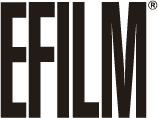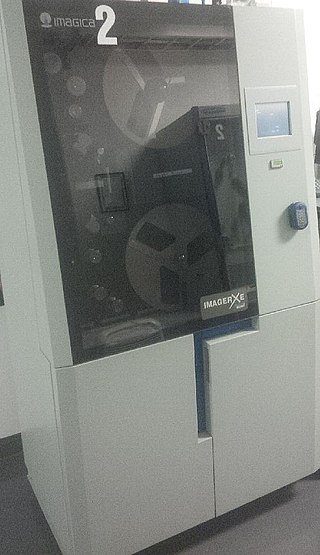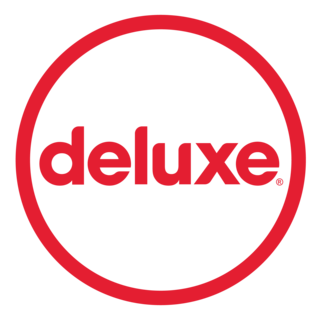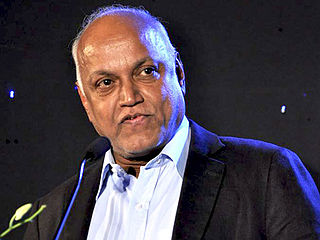
70 mm film is a wide high-resolution film gauge for motion picture photography, with a negative area nearly 3.5 times as large as the standard 35 mm motion picture film format. As used in cameras, the film is 65 mm (2.6 in) wide. For projection, the original 65 mm film is printed on 70 mm (2.8 in) film. The additional 5 mm contains the four magnetic stripes, holding six tracks of stereophonic sound. Although later 70 mm prints use digital sound encoding, the vast majority of existing and surviving 70 mm prints pre-date this technology.
IMAX is a proprietary system of high-resolution cameras, film formats, film projectors, and theaters known for having very large screens with a tall aspect ratio and steep stadium seating, with the 1.43:1 ratio format being available only in few selected locations.
Digital intermediate (DI) is a motion picture finishing process which classically involves digitizing a motion picture and manipulating the color and other image characteristics.

EFILM Digital Laboratories, founded in 1989, is a company serving the motion picture and television industry. Their clients include film studios, independent filmmakers, advertisers, animators, visual effects companies, and large-format filmmakers. EFILM is part of Deluxe Entertainment Services Group, a group of facilities that includes Beast, Company 3, Method Studios, and Rushes.

Color grading is a post-production process common to filmmaking and video editing of altering the appearance of an image for presentation in different environments on different devices. Various attributes of an image such as contrast, color, saturation, detail, black level, and white balance may be enhanced whether for motion pictures, videos, or still images. Color grading and color correction are often used synonymously as terms for this process and can include the generation of artistic color effects through creative blending and compositing of different layer masks of the source image. Color grading is generally now performed in a digital process either in a controlled environment such as a color suite, and is usually done in a dim or dark environment.

Todd-AO is an American post-production company founded in 1953 by Mike Todd and Robert Naify, providing sound-related services to the motion picture and television industries. The company retains one facility, in the Los Angeles area.
Film-out is the process in the computer graphics, video production and filmmaking disciplines of transferring images or animation from videotape or digital files to a traditional film print. Film-out is a broad term that encompasses the conversion of frame rates, color correction, as well as the actual printing, also called scannior recording.

Panavision Inc. is an American motion picture equipment company founded in 1954 specializing in cameras and lenses, based in Woodland Hills, California. Formed by Robert Gottschalk as a small partnership to create anamorphic projection lenses during the widescreen boom in the 1950s, Panavision expanded its product lines to meet the demands of modern filmmakers. The company introduced its first products in 1954. Originally a provider of CinemaScope accessories, the company's line of anamorphic widescreen lenses soon became the industry leader. In 1972, Panavision helped revolutionize filmmaking with the lightweight Panaflex 35 mm movie camera. The company has introduced other cameras such as the Millennium XL (1999) and the digital video Genesis (2004).
LaserPacific Media Corporation was a television and motion picture post-production facility operating in Hollywood, Burbank, Calif., New York, and in Vancouver, Canada. Initially, Laser-Pacific was a publicly traded corporation, before becoming a subsidiary of Eastman Kodak (2003-2010). In 2010 the subsidiary came under the ownership of HIG Capital (2010-2011) and was subsequently bought by Technicolor SA in 2011.

IMAGICA Lab. Inc. is a Japanese post-production company for films, television programmes and commercials, etc., established in 1935 and headquartered in Shinagawa, Tokyo, Japan. It is a subsidiary of Imagica Group.
da Vinci Systems was an American digital cinema company founded in 1984 in Coral Springs, Florida as a spinoff of Video Tape Associates. It was known for its hardware-based color correction products, GPU-based color grading, digital mastering systems, and film restoration and remastering systems. It was one of the earliest pioneers in post-production products. The company was owned by Dynatech Corporation for the majority of its lifespan until being bought by JDS Uniphase in 2005 and by Blackmagic Design in 2009.

Kantana Group is a production company established in Bangkok, Thailand in 1951 by Pradit and Somsook Kaljaruek. Kantana took its first step from radio dramas to films, television dramas, variety programs, and eventually moved on to become an integrated entertainment company.

Deluxe Media Inc., also known simply as Deluxe and formerly Deluxe Entertainment Services Group, Inc., is an American multinational multimedia and entertainment service provisions company owned by Platinum Equity, founded in 1915 by Hungarian-born American film producer William Fox and headquartered in Burbank, California.
Prasad Studios and Prasad Film Labs are motion picture post-production studios headquartered in Chennai, India, founded by Prasad Group in 1956. The production house has produced over 150 films in Telugu, Tamil, Kannada, Malayalam and Hindi languages.

Spirit DataCine is a telecine and a motion picture film scanner. This device is able to transfer 16mm and 35mm motion picture film to NTSC or PAL television standards or one of many High-definition television standards. With the data transfer option a Spirit DataCine can output DPX data files. The Spirit DataCine is made by DFT Digital Film Technology GmbH in Darmstadt, Germany.

Manmohan Shetty is an Indian entrepreneur who founded and developed Adlabs Films Ltd, one of India’s largest media and entertainment firms.
3ality Technica, formerly 3ality Digital, was a Burbank, California based company that specialized in high-definition, live-action stereoscopic digital 3D. The company developed production systems, image processing software and other technologies that enabled the creation, post-production and distribution of live-action 3D entertainment.

Company 3 (CO3) is an American post-production company founded in 1997 by colorists Stefan Sonnenfeld and Mike Pethel and visual effects artist/supervisor Noel Castley-Wright. Rob Walston brought the team of artists together and funded Company 3 under 4 Media Company (4MC). Company 3 provides post production, color grading and location services for feature films, commercials, music videos and television.
Reliance MediaWorks Limited (RMW) is a film and entertainment services company and a member of the Reliance Group.

Doremi Laboratories, Inc., often shortened to Doremi Labs, was a developer and manufacturer of digital servers and format converters for the digital cinema, broadcast, post-production and professional A/V markets. It was established in 1985 in Burbank, California, United States, and was absorbed into Dolby Laboratories in a 2014 acquisition.











